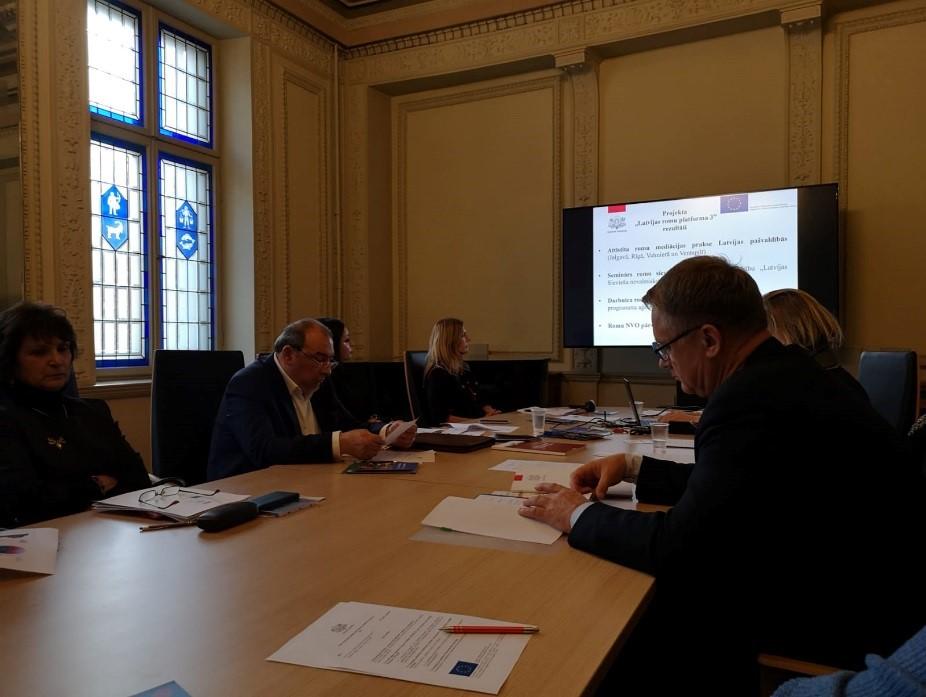Roma civil society: Latvia needs to investigate barriers to Roma inclusion
The second Roma Civil Monitor (RCM) report on Latvia has found that there are no specific national measures aimed at reducing unemployment among the Roma and the direct impact of various active labour market policies on Roma cannot be identified because the efficiency of such measures is not being assessed. In the area of housing, the poor state of the equipment needed for sanitation in facilities inhabited by Roma significantly restricts their access to the infrastructure crucial to meeting basic hygiene needs and increases the risk of contagious disease transmission. Communication between Roma and health care providers is either not as effective as it should be or completely dysfunctional. Lastly, the lack of data disaggregated by ethnicity on graduates from different levels of education makes it impossible to accurately describe what the situation of Roma access to education is and also impossible to fully assess the achievements and drawbacks of education policy with respect to Roma.
The RCM reports are part of a research project that began in 2017 and is funded by the European Commission for the purpose of strengthening the involvement of Roma civil society in the monitoring of Roma integration strategies across the EU. The added value of civil society monitoring is that it builds on the direct experience of Roma women and men and represents their independent voices. The report was drafted through a consultation process including Roma associations, civil society members, and community members.
“The influence and recommendations of civil society are important as they contribute to strengthening the Roma support system in national policies,” says Daiga Zaķe, director of the Center for Education Initiatives, which coordinated the report. “This is also important because the current Roma support system features several barriers to inclusion, such as individualized approaches and specific measures.”
 The November 2019 presentation of the first Roma Civil Monitor report on the implementation of the National Roma Integration Strategy in Latvia for Members of the Advisory Council on National Roma Integration Policy Implementation and Coordination at the Ministry of Culture. Culture Minister Nauoris Puntulis (right), President of the International Romani Union Normunds Rudevic (left). Photo by Daiga Zake
The November 2019 presentation of the first Roma Civil Monitor report on the implementation of the National Roma Integration Strategy in Latvia for Members of the Advisory Council on National Roma Integration Policy Implementation and Coordination at the Ministry of Culture. Culture Minister Nauoris Puntulis (right), President of the International Romani Union Normunds Rudevic (left). Photo by Daiga Zake
Although specific measures to support Roma in addressing unemployment are not implemented at national level, Roma registered with the State Employment Agency (SEA) have access to active labour market policy measures. Roma jobseekers can engage in any employment promotion activity, including training programmes, if they meet the criteria set for the specific target groups that do exist, such as students or youth. Anybody can receive career counselling or engage in summer employment activities, and youth who have completed vocational education have the opportunity to get a state-subsidised job for their first year of work. Long-term registered unemployed persons can also participate in a motivation programme that can be combined with the “Hired Temporary Public Works” employment initiative. Complaints about discrimination against Roma on the labour market have not been received by the SEA.
According to a study conducted in 2009 by Latvia’s RAXEN National Focal Point on “Housing Conditions of Roma and Travellers”, Roma people have more limited access to housing and the housing they do access is of lower quality compared to the rest of the population in Latvia. A 2015 study on “Roma in Latvia” found Roma often do not access social housing because they fail to meet the basic conditions for it, namely, that they clearly document their low-income status. For example, registered possession of an asset such as an automobile will prevent applicants from being legally recognized as needy, even if the asset in question is in the possession of somebody other than the official owner. Another disadvantaging factor with respect to housing is that the average Roma family is twice as large as the average household, which means almost 70 per cent of Roma live in overcrowded conditions. In 2015 a state support programme was begun to provide guaranteed loans for the first instalment of buying residential property; there are no statistics on how many Roma have participated, but it is believed that most could never access the funding because they could not afford to pay the minimum instalments necessary to qualify for a loan.
Civil society is recommending the Ministry of Welfare, the State Employment Agency and other state institutions develop criteria for assessing the effectiveness of the implemented programmes in order to identify the most effective ones and the most unsuccessful ones in terms of their accessibility by different target groups, including the Roma as a separate group. In developing priorities and implementing EU support programmes for improving infrastructure, programmes should be planned to improve residential sanitation – primarily, installation of running water and sewerage, as well as to purchase materials necessary for housing renovation so residents themselves can renovate their homes. Skilled Roma (for example, Roma mediators) should be employed in healthcare programmes to ensure the timely dissemination of the most important information from the healthcare sector to the Roma community, and more Roma teacher assistants working in preschool groups and primary education should be trained, as their current number is insufficient.
